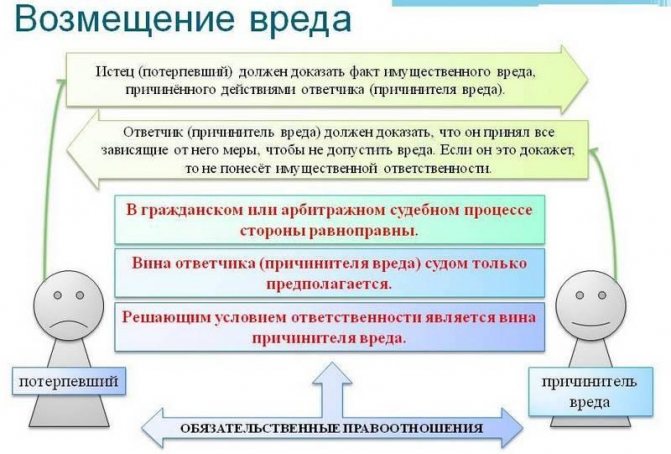The concept of compensation for moral damage as a way to protect civil rights
The main constitutional provisions of our country provide that the state is obliged to provide the victim with access to justice, as well as compensation for damage, both moral and physical.
Moral harm is a certain form of physical or moral suffering that a citizen experiences as a result of violation of his civil rights and freedoms. In our country, the institution of moral damage has existed for quite a long time, but is still considered one of the most unexplored legal norms.
Moral damages can arise from any violation of civil rights. If, as a result of a violation, physical harm is caused to a citizen, then it will contain a bit of moral harm, since as a result of physical damage the person will experience suffering. In this case, compensation for moral damage will be applied only at the request of the injured party.
Moral damage is a type of non-property right, and is not associated with causing specific material damage. However, this does not mean at all that if this damage is caused to a specific citizen, he cannot protect his civil rights. If desired, he can receive appropriate compensation in the form of money.
We will seek maximum compensation for moral damages
Help from a specialist with 20 years of experience!
+7
In what cases is compensation possible for causing moral damage?
If a person has suffered moral harm, he has the right to expect to receive monetary compensation from the perpetrator. It is only important to be able to prove that another citizen has encroached on his non-property rights. This is enshrined in the Civil Code of the Russian Federation, as well as in various legal acts.
Collection of funds occurs through the court. The grounds for appeal may be:
- disclosure of the secrets of the will to third parties;
- distribution of deliberately false advertising;
- violation of the personal data confidentiality policy;
- deception in the sale of travel packages;
- violation of consumer rights;
- exposure to tobacco smoke in non-smoking areas;
The victim is obliged to prove in court the fact of moral damage caused to him, as well as confirm the existence of circumstances for collecting compensation. If during the proceedings new facts are revealed that aggravate the situation, the amount of payment may be increased. This is regulated by Art. 1064 Civil Code of the Russian Federation .
If you get into an accident, a citizen can also demand compensation from the guilty person for not only material, but also moral damage. True, the fact of the occurrence of mental trauma will be much more difficult to prove. To do this, a number of examinations will have to be carried out.
General provisions on the grounds and procedure for applying compensation for moral damage
The recovery of compensation for moral damages is regulated in accordance with the current provisions of civil law. All issues that relate to the definition of the concept of moral damage and the establishment of specific monetary compensation are considered in Article 151 of the Civil Code of the Russian Federation.
In accordance with current legislative initiatives, moral damage is also subject to compensation, although it is recognized as a non-property type of damage. Even so, causing this damage violates a person's civil rights, and therefore it must be punished in accordance with the civil provisions of the legal framework.
It is worth noting that the moral harm that was caused to a person must have the necessary confirmation. In order to initiate legal proceedings regarding compensation for damage, there must be grounds in accordance with Art. 150 Civil Code of the Russian Federation:
- In relation to a particular citizen, the confidentiality of life was violated, and some personal or medical secrets were disclosed;
- The person was groundlessly brought to justice, including criminal liability, without providing evidence. Also, compensation for moral damage will be received in a situation where a restriction of freedom was imposed on a citizen;
- Causing harm to the life or health of a person, as well as damage to his reputation, good name and professional activities;
- Violation of privacy, manifested in the form of illegal entry into a person’s home and disclosure of confidential information regarding his life.
If such circumstances occur, then the victim has the right to file a claim for compensation for moral damage, based on the facts of violation of his civil rights and freedoms.
Evidence of damage and compensation rules
To prove that harm to health was actually caused, it is necessary to provide extracts from the hospital card or the history that the doctor writes during treatment in a hospital setting. You can also bring to court a sick leave certificate confirming during which period you did not attend the workplace. To prove moral suffering, you will need witnesses (at least two) who can describe your state of mind before and after the conflict between the victim and the defendant. So suffering alone is quite a disadvantageous activity.
When the court considers a case to recover compensation from a defendant, it will consider the following factors:
- the severity of the plaintiff’s moral distress;
- the severity of the plaintiff's physical injuries;
- all aspects of the case under consideration that are significant;
- the degree of guilt of the defendant;
- the relationship between the actions of the defendant and the condition of the victim;
- the degree of wrongfulness of the defendant’s actions against the plaintiff.
The court may satisfy the plaintiff’s claim for the full amount, for partial payment, or refuse it altogether. The verdict is fixed by a court decision. Then, the results of the consideration of the case go to the bailiffs, who, in turn, collect the amount from the defendant in accordance with the writ of execution. In case of collective liability, a separate writ of execution is issued for each perpetrator indicating the amount that he must pay to the person who filed the lawsuit. To avoid wasting time and to achieve punishment for the person who offended you. Or, on the contrary, to avoid liability for something you did not do (in case you were slandered and want to profit from it), contact experienced specialists with experience and practice in dealing with cases of compensation for moral damage and payment of compensation for physical and non-material damage caused. Consultations are free.
The concept and nature of moral harm
Civil legislation states that harm is a certain social phenomenon in public relations, creating obstacles to the normal implementation of their implementation. As for the concept of moral damage, it involves causing some kind of damage of a non-property nature, which, however, being an instrument of violation of civil human rights, may entail some form of liability in the form of monetary compensation.
Thus, moral harm acts as an independent legal institution, which is applied at the request of the injured party. The current legal system of our country provides that moral harm is a way of violating human rights and freedoms. And therefore, this act must entail proportionate punishment, which most often manifests itself in the form of such an instrument as compensation for moral damage.
It is paid to the victim in cash, and the amount of compensation for moral damage is established in court after consideration of all the circumstances of the case.
Special rules on compensation for moral damage
Moral damage is a very unique category of civil law, which provides for non-material damage associated with the physical or psychological suffering of a person that arises from the violation of his fundamental rights.
Compensation for moral damage is established in court, but there is still no specific judicial practice in resolving this issue. Our courts are guided by certain special rules before assigning a specific amount of monetary compensation.
In particular, we are talking about:
- Determining the nature and severity of the violation of civil rights in relation to the victim;
- The presence of certain suffering that is classified as non-material (temporary loss of ability to work, inability to further perform one’s professional duties, harm to health, etc.);
- Consideration of the specific harm that was caused to the victim as a result of the violation of his rights.
Damage assessment
It is important to learn how moral damages are calculated. This is a very labor-intensive task. The final decision on this matter is made by the judge, but the plaintiff is obliged to indicate in the application what amount he expects. The main advice from legal practitioners is that the payment specified in the application should not appear as if the applicant is hoping to improve his well-being in this way. The amount indicated in the claim must be as adequate as possible and reflect the suffering suffered by the victim.
When resolving such an issue, it is best to discuss the amount with an expert who has been repeatedly involved in such cases. We must not forget that, theoretically, the consideration of the case could end in favor of the defendant. One more point: according to the Civil Code, compensation can be provided exclusively in monetary form.
Procedure for compensation for moral damage
Based on current legislative principles, moral damage must be noted in court.
In order to receive the necessary protection of civil rights, the victim must apply to the court with an appropriate petition, having previously prepared documentary support for the process and the evidence base.
After the petition has been submitted for consideration, the court will determine the method and amount of compensation for moral damage, but before that large-scale work will be carried out.
In particular, the court will have to do the following:
- Determining the nature of the relationship between the victim and the accused;
- Determination of the actual damage that was caused to the injured party;
- Determination of the reasons that led to the commission of a criminal act that resulted in moral damage;
- Determination of the specific amount that will be recovered from the accused in favor of the victim when determining all the circumstances of the case.
How to file a claim
In order to defend their rights, the victim can apply to the judicial authority at the place of his residence or the place of registration of his offender. Such claims are considered in a court of general jurisdiction.
If one of the parties does not agree with the decision, then it can file a cassation appeal. Then the claim will be considered by the court of second instance - cassation.
The statement of claim itself must:
- Provide the correct details of the place where the claim is being filed.
- Provide information: yours and the defendant’s.
- Justify what kind of damage was caused, as well as the desired amount of recovery for this damage.
- List all the evidence against your offender.
Proof
In addition to witness testimony, the following documentation may be used as evidence:
- an article in the media in which, for example, false information about you was published;
- a certificate of incapacity for work issued due to damage to your health by another person;
- results of an independent forensic medical examination;
- personal correspondence or family photos, if you want to compensate for damage due to the loss of your relative;
- other papers that can be used as evidence of moral damage suffered by the plaintiff.
Process
During the trial itself, the issue of amicable settlement of disputes is often raised. And compensation for moral damage in such situations is made according to the wishes of the injured party and the consent of the defendant.
But when the court finds this to be a violation of the law, such a decision may not be approved. Proceedings can be terminated only after mutual agreement. In the event of a settlement, the victim does not have the right to file a claim again. Sometimes this position is beneficial to the offender.
The result of legal proceedings will be a judicial decision, which can be challenged within the period established by law. But the legislation provides for two exceptional cases: the plaintiff did not appear at the hearing or the circumstances of the case have already changed in favor of the plaintiff.
It is still better to re-draft the application with a lawyer. It will help you consider your options for future litigation. And this way you can spend less of your money and lose less time, since your offender may use a trick and file a counterclaim against you for false accusations.
Amount of compensation for moral damage
The criteria for determining the amount of compensation for moral damage can be very diverse. However, it is worth noting that our legislative framework does not address this issue in any way.
This leads to the fact that the courts are forced to independently determine specific amounts, which periodically leads to precedents when completely different amounts of compensation are awarded for the same violation.
To avoid such situations, courts review current judicial practice and make a final decision based on it. This helps to create some kind of system for determining moral damages and the amount of money that will be established as a compensation payment.
Author of the article
Grounds for filing a claim
Do not file a claim for compensation for moral damages until you have determined the grounds for this. You need to understand whether this makes any sense at all or whether it will simply be a waste of your time and money.

Our following recommendations will help you with this:
- Determine whether, according to the law, your situation falls under the definition of moral damages. If it is difficult for you to understand this yourself, then it is better to consult a lawyer.
- It is necessary to understand whether the harm caused to you was intentional or just the result of a coincidence.
- Analyze whether you have a sufficient evidence base for this: witnesses to the incident and your depressed state, medical certificates, receipts for medications, and others.
- If you are counting on a fairly impressive amount of compensation, use the services of a highly qualified lawyer.
- If the amount of your claim is insignificant, then it makes sense to file it only if you are completely confident that you can win the case. Remember that a trial is both a cost and a waste of energy and precious time.






